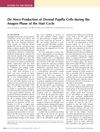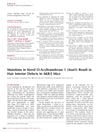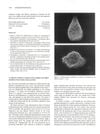 May 2023 in “Skin research and technology”
May 2023 in “Skin research and technology” A DNA aptamer helps promote hair growth by enhancing a key cell growth signal in hair follicle cells.
8 citations,
May 2005 in “Fertility and Sterility” A specific gene variation is linked to a higher risk of polycystic ovary syndrome in Caucasian women.
[object Object] 11 citations,
December 2017 in “Orphanet Journal of Rare Diseases” A new mutation in the ST14 gene broadens the understanding of ichthyosis-hypotrichosis syndrome.
 August 2019 in “Journal of The American Academy of Dermatology”
August 2019 in “Journal of The American Academy of Dermatology” 5% minoxidil foam effectively regrows hair in women, with postmenopausal women seeing the most improvement.
 5 citations,
December 2021 in “Physiological Research”
5 citations,
December 2021 in “Physiological Research” Men, particularly those with hair loss, are more likely to get the virus, and those with prostate cancer may have milder symptoms. Testosterone's role in the disease is unclear, and the virus doesn't seem to harm male fertility. Women with PCOS might be at higher risk. More research is needed.
 29 citations,
May 2018 in “Clinical Endocrinology”
29 citations,
May 2018 in “Clinical Endocrinology” Recent genetic insights show that low-renin hypertension includes a range from essential hypertension to secondary or familial forms, affecting diagnosis and treatment.
 28 citations,
April 2010 in “British Journal of Dermatology”
28 citations,
April 2010 in “British Journal of Dermatology” Genetic marker rs12558842 strongly linked to male hair loss.
 12 citations,
August 2020 in “Annals of Oncology”
12 citations,
August 2020 in “Annals of Oncology” Androgen deprivation therapy might be better for preventing COVID-19 than treating it.
 4 citations,
July 2012 in “Genesis”
4 citations,
July 2012 in “Genesis” The Megsin-Cre transgene is a new tool for genetic manipulation in the skin and upper digestive tract.
 1 citations,
November 2014
1 citations,
November 2014 The document explains hair and nail biology, common hair loss conditions and treatments, oral and genital skin diseases, and the risks and treatments associated with squamous cell carcinoma.
 1 citations,
January 2010 in “Elsevier eBooks”
1 citations,
January 2010 in “Elsevier eBooks” Any drug can cause skin reactions, but antibiotics, NSAIDs, and psychotropic drugs are more common, with some reactions being life-threatening.
 401 citations,
January 2013 in “Postepy Dermatologii I Alergologii”
401 citations,
January 2013 in “Postepy Dermatologii I Alergologii” The paper concludes that understanding melanocyte development can help in insights into skin diseases and melanoma diversity.
 333 citations,
February 2010 in “Cell Stem Cell”
333 citations,
February 2010 in “Cell Stem Cell” Stem cell niches are crucial for regulating stem cell behavior and tissue health, and their decline can impact aging and cancer.
 277 citations,
June 2003 in “The journal of investigative dermatology. Symposium proceedings/The Journal of investigative dermatology symposium proceedings”
277 citations,
June 2003 in “The journal of investigative dermatology. Symposium proceedings/The Journal of investigative dermatology symposium proceedings” Epithelial-mesenchymal interactions control hair growth cycles through specific molecular signals.
 224 citations,
March 2006 in “Seminars in Cutaneous Medicine and Surgery”
224 citations,
March 2006 in “Seminars in Cutaneous Medicine and Surgery” The document concludes that understanding hair follicle biology can lead to better hair loss treatments.
 98 citations,
February 2007 in “Seminars in Cell & Developmental Biology”
98 citations,
February 2007 in “Seminars in Cell & Developmental Biology” Androgens can both stimulate and cause hair loss, and understanding their effects is key to treating hair disorders.
 67 citations,
December 2019 in “PloS one”
67 citations,
December 2019 in “PloS one” Beta-caryophyllene helps improve wound healing in mice, especially in females.
 60 citations,
June 1997 in “Journal of The American Academy of Dermatology”
60 citations,
June 1997 in “Journal of The American Academy of Dermatology” Apoptosis is crucial for healthy skin and treating skin diseases.
 49 citations,
April 2012 in “Phytotherapy Research”
49 citations,
April 2012 in “Phytotherapy Research” Rosemary leaf extract may be an effective natural treatment for hair growth and male pattern baldness.
 41 citations,
June 2010 in “Journal of Investigative Dermatology”
41 citations,
June 2010 in “Journal of Investigative Dermatology” New cells are added to the hair's dermal papilla during the active growth phase.
 36 citations,
July 2020 in “Frontiers in Medicine”
36 citations,
July 2020 in “Frontiers in Medicine” Spironolactone might help protect against severe lung problems in COVID-19 patients.
 29 citations,
October 2016 in “Cell death and differentiation”
29 citations,
October 2016 in “Cell death and differentiation” ΔNp63α stops TAp73β from working in skin cancer by blocking its access to specific genes, not by directly interacting with it.
 23 citations,
June 2010 in “Journal of Investigative Dermatology”
23 citations,
June 2010 in “Journal of Investigative Dermatology” A mutation in the Soat1 gene causes hair structure defects and other health issues in AKR/J mice.
 15 citations,
March 2014 in “Molecular Medicine Reports”
15 citations,
March 2014 in “Molecular Medicine Reports” α-spinasterol from Melandrium firmum can help reduce prostate enlargement.
 14 citations,
December 2010 in “Journal of human genetics”
14 citations,
December 2010 in “Journal of human genetics” A Japanese patient with IFAP syndrome had a severe MBTPS2 gene mutation but showed milder symptoms than previously observed cases.
[object Object]  10 citations,
January 2015 in “Przeglad Menopauzalny”
10 citations,
January 2015 in “Przeglad Menopauzalny” Progestogens are essential in menopausal hormone therapy to prevent uterine cancer and must be chosen carefully based on individual needs.
 8 citations,
September 1993 in “British journal of dermatology/British journal of dermatology, Supplement”
8 citations,
September 1993 in “British journal of dermatology/British journal of dermatology, Supplement” A new method helps isolate key hair components to study hair growth and loss.
 7 citations,
January 2021 in “The journal of gene medicine”
7 citations,
January 2021 in “The journal of gene medicine” Certain genetic differences may affect how likely someone is to get COVID-19 and how severe it might be.
 7 citations,
January 1994 in “Annual Reports in Medicinal Chemistry”
7 citations,
January 1994 in “Annual Reports in Medicinal Chemistry” Understanding how androgens work is key for creating new treatments for prostate issues and hair/skin conditions.
 4 citations,
May 2021 in “Journal of The European Academy of Dermatology and Venereology”
4 citations,
May 2021 in “Journal of The European Academy of Dermatology and Venereology” Hair loss doesn't affect COVID-19 severity.




























